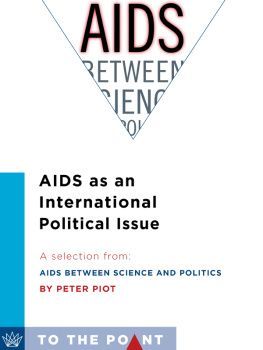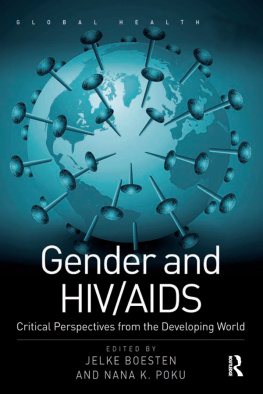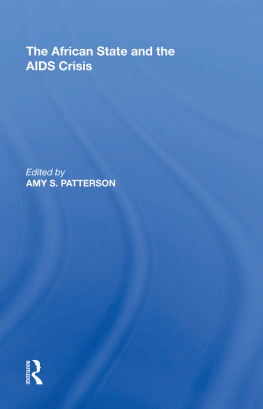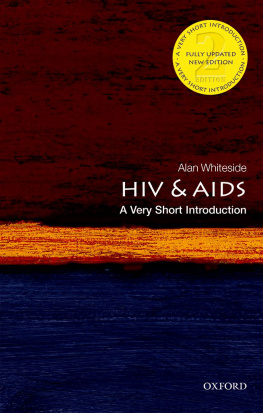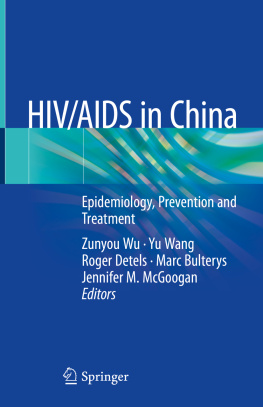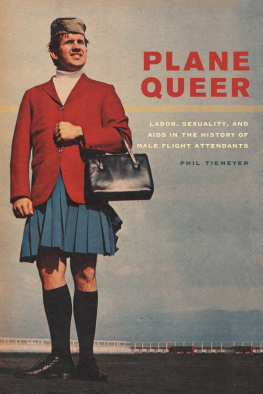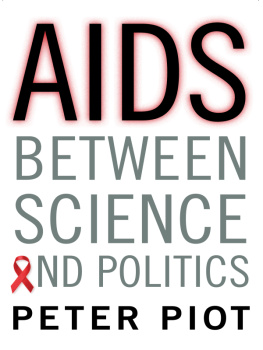HIV/AIDS in India
India ranks third in the number of people living with HIV/AIDS globally. The country has high levels of poverty and inequality, poor healthcare infrastructure, especially away from the metropolitan areas, and a legacy of colonialism that bequeathed laws criminalizing non-heteronormative sexualities. These factors mean that many minority groups do not receive adequate access to preventative and treatment programs.
This book explores the HIV/AIDS epidemic in India. Based on research in Tamil Nadu, it presents experiences of those marginalized by their sexuality and/ or gender, their struggles and their triumphs. Based on interviews with male and female sex-workers, men who have sex with men, aravanis (male to female transgenders) and HIV positive womengroups usually not included in the policy-making by Indian government agencies, international donors and international NGOsthe author uses an interdisciplinary approach. The approach highlights the historical and cultural context, while providing contemporary narratives. The book thus presents a deeper, multi-dimensional, understanding of the context of the disease and comprehends the roots of the stigma and discrimination that exacerbate the epidemic.
An important study of the global HIV/AIDS epidemic, this book will be of interest to researchers in the field of South Asian Studies, Sexuality and Gender Studies, Health Sciences and Public Health.
Sunita Manian is Professor of Political Economy and Chair of the Department of Philosophy and Liberal Studies at Georgia College and State University, USA.
Routledge Research on Gender in Asia Series
For a full list of titles in this series, please visit www.routledge.com/Routledge-Research-on-Gender-in-Asia-Series/book-series/RRGAS
12 Motherhood and Work in Contemporary Japan
Junko Nishimura
13 Gender, Violence and the State in Asia
Edited by Amy Barrow and Joy L. Chia
14 Intimacy and Reproduction in Contemporary Japan
Genaro Castro-Vzquez
15 Postcolonial Lesbian Identities in Singapore
Re-thinking Global Sexualities
Shawna Tang
16 Unmarried Women in Japan
The Drift into Singlehood
Akiko Yoshida
17 Perverse Taiwan
Edited by Howard Chiang and Yin Wang
18 Literature, Gender and the Trauma of Partition
The Paradox of Independence
Debali Mookerjea-Leonard
19 Sexuality and Public Space in India
Reading the Visible
Carmel Christy
20 HIV/AIDS in India
Voices from the Margins
Sunita Manian
First published 2017
by Routledge
2 Park Square, Milton Park, Abingdon, Oxon OX14 4RN
and by Routledge
711 Third Avenue, New York, NY 10017
Routledge is an imprint of the Taylor & Francis Group, an informa business
2017 Sunita Manian
The right of Sunita Manian to be identified as author of this work has been asserted by her in accordance with sections 77 and 78 of the Copyright, Designs and Patents Act 1988.
All rights reserved. No part of this book may be reprinted or reproduced or utilized in any form or by any electronic, mechanical, or other means, now known or hereafter invented, including photocopying and recording, or in any information storage or retrieval system, without permission in writing from the publishers.
Trademark notice: Product or corporate names may be trademarks or registered trademarks, and are used only for identification and explanation without intent to infringe.
British Library Cataloguing in Publication Data
A catalogue record for this book is available from the British Library
Library of Congress Cataloging in Publication Data
Names: Manian, Sunita, author.
Title: HIV/AIDS in India : voices from the margins / Sunita Manian.
Other titles: Routledge research on gender in Asia series ; 20.
Description: Abingdon, Oxon ; New York, NY : Routledge, 2018. |
Series: Routledge research on gender in Asia series ; 20 | Includes
bibliographical references and index.
Identifiers: LCCN 2017001645| ISBN 9781138630512 (hbk) |
ISBN 9781315209388 (ebk)
Subjects: | MESH: HIV Infectionspsychology | Acquired
Immunodeficiency Syndromepsychology | Health Status Disparities |
Vulnerable Populations | Sexual Minorities | Sex Workers | India
Classification: LCC RA643.86.I4 | NLM WC 503.7 | DDC
362.19697/9200954dc23
LC record available at https://lccn.loc.gov/2017001645
ISBN: 978-1-138-63051-2 (hbk)
ISBN: 978-1-315-20938-8 (ebk)
Typeset in Times New Roman
by Wearset Ltd, Boldon, Tyne and Wear
For Jim, who made me believe in myself again, and has been the humsafar in this and many other journeys;
For Appa, the first feminist in my life;
For Amma, who has nourished the effort with her love;
For Sabi, sister, best friend and loving critic;
For Brad, for being as much brother as brother-in-law;
And
For all those who opened their hearts to me and shared their life-stories.
First and foremost I have to thank Jim Winchester. Without his persistent encouragement this research would have never got off the ground. Thank you, Jim, for the countless hours spent reading drafts and providing invaluable insight into the ethics of inequalities, not to mention the steady supply of coffee and wine. Deep gratitude to the other thoughtful critic, Sabita Manian, whose loving guidance came at all the crucial moments. I thank Appa and Amma who have instilled in me the importance of hearing the voices of the voiceless, and who sustained me with their love and advice during my travels in Tamil Nadu. Finally, thanks to Brad for the Manhattans that came at the right moments.
I thank Georgia College and State University for providing the most important gift for a researchertime, to gather the ethnographic material that grounds this work. In particular, I thank Dean Ken Procter and Associate Dean Funke Fontenot for their strong support for my research endeavors.
My deepest gratitude goes to the many people who agreed to be interviewed for this book. It is your generosity in sharing your time and stories that made this book possible. It is my sincere hope that this book does justice to the kindness you showed me in opening up to me during those countless hours of interviews. Thanks to the many people at various NGOs, CBOs and other organizations who helped me learn about HIV in India, including A.K. Ganesh, Rochelle D Souza, C.J. Sethulaxmi, A.J. Hariharan, P. Kausalya, Malar and Ashok Prabath, and Anthony. Your guidance was invaluable in shaping my research. Thanks also to Geeta-Mami and Jaswinder Singh Waraich for your help and advice at important points.
Finally, I thank Routledge and its magnificent editor, Dorothea Schaefter, who brought this book to fruition. My immense gratitude also to Lily Brown at Routledge, for her patience, guidance and advice throughout the publication process.
1
Introduction
We want to open our hearts and speak to you truthfully so that you can take our truth to the world. We want the world to understand our lives. These were the words of Saroja, a female sex-worker as I sat with her and two other women, Sarala and Kamla, also sex-workers, on a warm January afternoon in Chennai, in the Southern state of Tamil Nadu, India, listening to their life-stories. I was in Tamil Nadu trying to understand the HIV/AIDS epidemic through the experiences of those marginalized by their sexuality and/or gender, and doubly jeopardized by their impoverished economic and social circumstances. This book is a result of that mission and endeavors to give a voice to male and female sex-workers, males who have sex with males (MSMs), In particular I wanted to record the narratives of their livestheir struggles and triumphswithin the larger context of the HIV/AIDS discourse, where they have traditionally been treated as the mute beneficiaries of benevolent policy formulated by experts.


